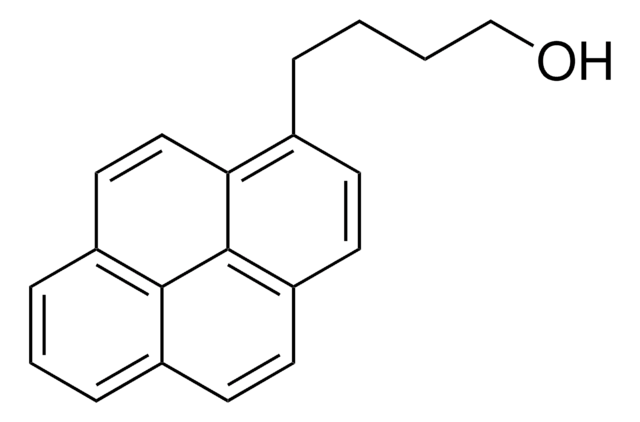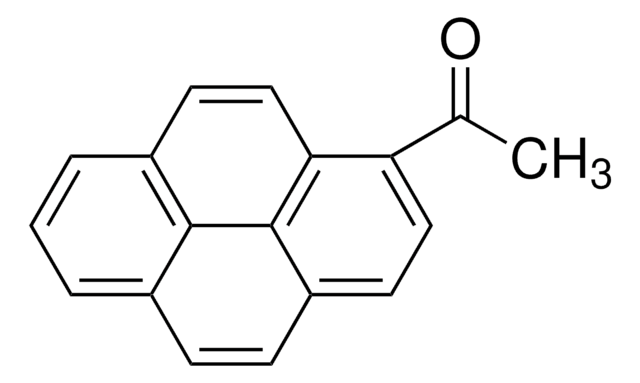391581
1-Pyrenecarboxylic acid
97%
Iniciar sesiónpara Ver la Fijación de precios por contrato y de la organización
About This Item
Fórmula empírica (notación de Hill):
C17H10O2
Número de CAS:
Peso molecular:
246.26
Beilstein/REAXYS Number:
2375854
MDL number:
UNSPSC Code:
12352103
PubChem Substance ID:
NACRES:
NA.23
Productos recomendados
Quality Level
assay
97%
mp
270-272 °C (lit.)
SMILES string
OC(=O)c1ccc2ccc3cccc4ccc1c2c34
InChI
1S/C17H10O2/c18-17(19)14-9-7-12-5-4-10-2-1-3-11-6-8-13(14)16(12)15(10)11/h1-9H,(H,18,19)
InChI key
HYISVWRHTUCNCS-UHFFFAOYSA-N
¿Está buscando productos similares? Visita Guía de comparación de productos
Categorías relacionadas
General description
1-Pyrenecarboxylic acid (PCA) is a polyaromatic derivative that has an amphiphilic characteristic. It is a fluorophore that shows absorption spectra in the UV region. PCA has a carboxylic acid group that attaches with pyrene nucleus. It can be used as a sensitizer that facilitates the electron transport from one medium to another.
Application
Functionalized pyrene for synthesis.
PCA can be used in the surface modification of graphene and carbon nanotubes (CNTs), which can further be used for a variety of electronic applications.
Storage Class
11 - Combustible Solids
wgk_germany
WGK 3
flash_point_f
Not applicable
flash_point_c
Not applicable
ppe
Eyeshields, Gloves, type N95 (US)
Elija entre una de las versiones más recientes:
¿Ya tiene este producto?
Encuentre la documentación para los productos que ha comprado recientemente en la Biblioteca de documentos.
Los clientes también vieron
Fereshteh Chekin et al.
Analytical and bioanalytical chemistry, 411(20), 5149-5157 (2019-06-30)
A mandatory step in any sensor fabrication is the introduction of analyte-specific recognition elements to the transducer surface. In this study, the possibility to anchor β-cyclodextrin-modified dopamine to a reduced graphene oxide based electrochemical transducer for the sensitive and selective
S Krawczyk et al.
Spectrochimica acta. Part A, Molecular and biomolecular spectroscopy, 198, 19-26 (2018-03-04)
The electronic structure of excited photosensitizer adsorbed at the surface of a solid is the key factor in the electron transfer processes that underlie the efficiency of dye-sensitized solar cells and photocatalysts. In this work, Stark effect (electroabsorption) spectroscopy has
Noncovalent functionalization as an alternative to oxidative acid treatment of single wall carbon nanotubes with applications for polymer composites
Simmons TJ, et al.
ACS Nano, 3(4), 865-870 (2009)
Haodong Liu et al.
Advanced materials (Deerfield Beach, Fla.), 33(8), e2004782-e2004782 (2021-01-16)
The revolutionary and pioneering advancements of flexible electronics provide the boundless potential to become one of the leading trends in the exploitation of wearable devices and electronic skin. Working as substantial intermediates for the collection of external mechanical signals, flexible
El Hadji Mamour Sakho et al.
Materials science & engineering. C, Materials for biological applications, 95, 43-48 (2018-12-24)
We herein report the synthesis of MFe2O4 (M = Mn, Mg)/reduced graphene oxide (MFe2O4/RGO) through a simple and novel pressure cooker assisted solvothermal method. The structure and morphology of the as-prepared materials were investigated using X-ray diffraction (XRD), transmission electron microscopic (TEM)
Nuestro equipo de científicos tiene experiencia en todas las áreas de investigación: Ciencias de la vida, Ciencia de los materiales, Síntesis química, Cromatografía, Analítica y muchas otras.
Póngase en contacto con el Servicio técnico











